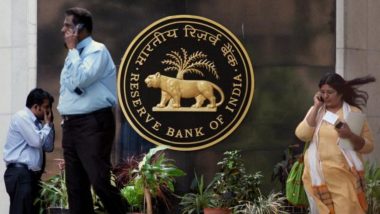New Delhi, March 31: The RBI is likely to cut benchmark interest rate by another 100 bps in 2020-21 fiscal and continue to employ all policy tools at its disposal to support growth and financial stability to contain the impact of Covid-19 pandemic on the economy, Fith Solutions said Tuesday.
The Reserve Bank of India (RBI) cut benchmark repurchase (repo) rate by 75 basis points and its reverse repurchase rate by 90 basis points at an emergency meeting on March 27, bringing the rates to 4.40 per cent and 4.00 per cent, respectively, from 5.15 per cent and 4.90 per cent, previously. Catch all the live updates related to coronavirus outbreak in India and other parts of the world.
In an outlook for India's interest rates, Fitch Solutions said an easing of inflation back within the RBI's 2-6 per cent target range will provide room for the RBI to ease monetary policy further over the course of the year to support the economy.
"We at Fitch Solutions expect the central bank to cut its policy rates by another 100 bps by end-FY2020/21 (April-March) as well as continue employing all policy tools at its disposal to support growth and financial stability as the economy gets severely hit by the Covid-19 pandemic," it said.
Additionally, it expects a sharp increase in government borrowing over the coming months to tighten credit conditions, this should see the RBI step in to lower rates through further cuts to its benchmark rates and increase its government bond purchases through open market repo operations.
"Growth will face significant headwinds over the coming quarters due to the Covid-19 impact and we have accordingly revised our FY2020/21 (April–March) real GDP growth forecast to 4.6 per cent, from 5.4 per cent previously, marking a slowdown from our estimate of 4.9 per cent in FY2019/20, and we continue to flag downside risks to this view," it said.
This would also provide the impetus for further monetary easing, it noted, adding that a weak growth outlook will prompt additional fiscal stimulus over the coming months. Centre Responds to Plea on Stranded Labourers in Supreme Court, Says 'No Migrants on Road as of 11am Today'.
The government's Rs 1.7 lakh crore fiscal stimulus announced on March 26 accounts for 0.7 per cent of GDP, which Fitch said was "grossly inadequate" given the strong headwinds the Indian economy will face.
"Given that revenue collection will also face tremendous pressure amid weak economic activity, we believe that government spending will have to be funded heavily by borrowing and an increase in government borrowing will push up yields in the market.
"This is likely to see the RBI step up their government bond purchases through open market operations and also lower their benchmark interest rates to signal market interest rates lower to ease credit conditions," it added.
Fitch Solutions said consumer price inflation returning back to the RBI's 2-4 per cent target range will permit further monetary easing. Headline inflation was last recorded to have eased slightly to 6.6 per cent in February, from 7.6 per cent in January.
"We expect the sharp fall in international oil prices following the collapse of the collapse of OPEC+ market management in early March, to result in fuel price deflation over the coming months given that India imports 80 per cent of its oil needs," it said. Brent oil price has fallen significantly from as high as USD 70 per barrel in January to the mid-USD 20.
"While the pass-through in oil price reduction has so far been weak, we believe that this could be due to delays along the supply chain and that the lower prices will gradually feed through," it said. "Core inflation is also set to weaken on soft domestic demand as the Covid-19 outbreak takes its toll on the Indian economy."
The rating agency said while it had previously expected a good winter harvest to ease food supply conditions and aid a fall in food inflation, which came in at 9.5 per cent in February, the nationwide lockdown in place since March 25 would lead to food inflation not easing ease as much as previously anticipated as farmers face difficulty in transporting the crop to the markets.
Crops not reaching markets were reportedly due to police blockades and a lack of truckers to move commodities from the countryside and ports to the cities as the virus had forced many to return home to the villages where reported cases of Covid-19 are less than the cities. Fitch Solutions revised up its inflation forecast slightly to 4 per cent in FY 2020/21, from 3 per cent previously.













 Quickly
Quickly




















